Intelligent mobility on demand
About
Urban mobility and access is a concern for transport planners, ecologists, economists, as well as individuals. New ideas are required to increase mobility and access for ever-growing cities in a sustainble way, this means in a way that decreases traffic, fuel consumption, or emissions.
Sharing transport resources suggests itself for reaching this goal. A team of researchers at the University of Melbourne and Monash University is investigating the viability of novel mobility on demand systems in various urban environments and scenarios. Supported by mobile communication and intelligent tools shared travelling appears the smart solution to ad-hoc urban travel demand.
This project has now concluded. To find more about the outcomes of the initiative, view our publications.
Contact us
For feedback, requests or further information send us an email:
- Prof Stephan Winter

Discipline Leader, Geomatics
Email: winter@unimelb.edu.au
Projects
Intelligent Mobility on Demand involves the following projects:
Urban Mobility and Intelligent Transport
Carlton Connect Initiative Funds Project
This project consists of two work packages: Victorian Future Mobility Sensing project; and simulation based investigation of the impact of new initiatives on sustainable transportation.
Researchers
Stephan Winter, Ronny Kutadinata, Chris Leckie, Richard Sinnott, Russell Thompson, Iven Mareels, Robin Evans, Abbas Rajabifard, Chris Manzie (The University of Melbourne), and Nicole Ronald (Swinburne University)
Partners
Department of Economic Development, Jobs, Transport and Resources (Victoria), MIT, SMART, and IBM Research
Victorian Future Mobility Sensing project
ISORT: Intelligent Self-Organising Transportation
ARC Discovery Project 0878119 (2008–2010)
Researcher
Stephan Winter
Social cars meet social travellers
Australia-Germany Joint Research Co-operation Scheme (UA-DAAD) (2016–2017)
Researchers
Stephan Winter, Monika Sester (Leibniz University Hannover)
iMoD: Integrating Mobility on Demand in Urban Transport Infrastructures
ARC Linkage Project 2012–2014
Researchers
Stephan Winter, Colin Duffield, Lars Kulik and Rao Kotagiri (The University of Melbourne), Russell Thompson and Mark Wallace (Monash University), Martin Savelsbergh (The University of Newcastle, left June 2014)
Partners
Department of Transport (Victoria), VicRoads, Yarra Trams, Royal Automobile Club Victoria, Haasz Technology
iBus: Public Transport on Demand
Preliminary feasibility study (2010)
Researchers
Kanchana Sakulchariyalert, Russell Thompson, Priyan Mendis, John Haasz (donor), Stephan Winter (contributing)
Effective Decentralised Transport Management
NICTA project
Researchers
Stephan Winter, Santosh Kulkarni
People
The key researchers currently involved in this initiative are:
- Stephan Winter, The University of Melbourne, Australia
- Russell Thompson, The University of Melbourne, Australia
- Lars Kulik, The University of Melbourne, Australia
- Maria Vasardani, The University of Melbourne, Australia
Several PhD candidates and final-year students are also involved:
- Haifeng Zhao, The University of Melbourne, Australia (supervisors: Stephan Winter, Nicole Ronald)
- Zahra Navidikashani, The University of Melbourne, Australia (supervisors: Stephan Winter, Nicole Ronald, Ronny Kutadinata)
- Subhrasankha Dey, The University of Melbourne, Australia (supervisors: Stephan Winter, Martin Tomko)
- Debjit Bhowmick, The University of Melbourne, Australia (supervisors: Stephan Winter, Mark Stevenson)
Previous participants include:
- Stephen Roddis, The University of Melbourne, Australia
- Farzad Khodadadi, The University of Melbourne, Australia
- Martin Savelsbergh, University of Newcastle, Australia
- Alan Lee, University of Newcastle, Australia (supervisors: Martin Savelsbergh, Natashia Boland)
- Michael Rigby, The University of Melbourne, Australia (supervisors: Stephan Winter, Nicole Ronald)
- Shubham Jain, The University of Melbourne, Australia (supervisors: Stephan Winter, Nicole Ronald, Russell Thompson)
- Mark Wallace, Monash University, Australia
- Nicole Ronald, Swinburne University, Australia
- Colin Duffield, The University of Melbourne, Australia
- Ronny Kutadinata, The University of Melbourne, Australia
- Rahul Deb Das, The University of Melbourne, Australia (supervisors: Stephan Winter, Nicole Ronald)
- Yao-Li Wang, The University of Melbourne, Australia (supervisors: Stephan Winter, Nicole Ronald)
- Santa Maiti, The University of Melbourne, Australia (supervisor: Stephan Winter)
- Surabhi Gupta, The University of Melbourne, Australia (supervisors: Stephan Winter, Allison Kealy)
Publications
-
Activity-based ridesharing: Increasing flexibility by time geography
Abstract
Ridesharing is an emerging travel mode that reduces the total amount of traffic on the road by combining people’s travels together. While present ridesharing algorithms are tripbased, this paper aims to achieve significantly higher matching chances by a novel, activity-based algorithm. The algorithm expands the potential destination choice set by considering alternative destinations that are within given space-time budgets and would provide a similar activity function as the originals. In order to address the increased combinatorial complexity of trip chains, the paper introduces an efficient space-time filter on the foundations of time geography to search for accessible resources. Globally optimal matching is achieved by binary linear programming. The ridesharing algorithm is tested with a series of realistic scenarios of different population sizes. The encouraging results demonstrate that the matching rate by activity-based ridesharing is signicantly increased from the baseline scenario of traditional trip-based ridesharing.
-
A Neuro-Fuzzy based Hybrid Intelligent Framework for Transport Mode Detection
R. Das and S. Winter, ‘A Neuro-Fuzzy based Hybrid Intelligent Framework for Transport Mode Detection,’ in Proceedings of the 6th International Workshop on Mobile Entity Localization, Tracking and Analysis (MELT), 2016.
Abstract
Understanding transport mode detection, is important to transport planning and movement behavior analysis. In order to detect the transport modalities from GPS trajectories, various machine learning approaches have already been explored. However, the majority of them produce only a single conclusion from a given set of evidences, ignoring the uncertainty of any mode classication. Also, the existing machine learning approaches fall short in explaining their reasoning scheme. In contrast, a fuzzy expert system can explain its reasoning scheme in a human readable format with more exibility, but lacks the adaptivity and learning ability of machine learning. In this paper, a novel multi-layered hybrid intelligent framework is developed by integrating a fuzzy logic and a machine learning approach to complement each other’s limitations. Thus in this paper an intelligent fuzzy logic-based near-real time mode detection framework is presented that can perform comparable to state-of-the-art machine learning approaches by bridging the trade-off between explanatory power and prediction accuracy of the models. The results demonstrate that the proposed framework has achieved the aim in the context of near-real time transport mode detection.
-
Automated Urban Travel Interpretation: A Bottom-up Approach for Trajectory Segmentation
Abstract
Understanding travel behavior is critical for an effective urban planning as well as for enabling various context-aware service provisions to support mobility as a service (MaaS). Both applications rely on the sensor traces generated by travellers’ smartphones. These traces can be used to interpret travel modes, both for generating automated travel diaries as well as for real-time travel mode detection. Current approaches segment a trajectory by certain criteria, e.g., drop in speed. However, these criteria are heuristic, and, thus, existing approaches are subjective and involve significant vagueness and uncertainty in activity transitions in space and time. Also, segmentation approaches are not suited for real time interpretation of open-ended segments, and cannot cope with the frequent gaps in the location traces. In order to address all these challenges a novel, state based bottom-up approach is proposed. This approach assumes a fixed atomic segment of a homogeneous state, instead of an event-based segment, and a progressive iteration until a new state is found. The research investigates how an atomic state-based approach can be developed in such a way that can work in real time, near-real time and offline mode and in different environmental conditions with their varying quality of sensor traces. The results show the proposed bottom-up model outperforms the existing event-based segmentation models in terms of adaptivity, flexibility, accuracy and richness in information delivery pertinent to automated travel behavior interpretation.
-
Autonomous car and ride sharing: flexible road trains
This paper won the Best Vision Paper award and the CCC Blue Sky Ideas award. Read more in the CCC website.
Abstract
Since in many cities transport infrastructure is operating at or beyond capacity, novel approaches to organize urban mobility are gaining attraction. However, assessing the benefits of a measure that has disruptive capacity in a complex system requires a carefully designed research. This paper takes a recent idea for urban mobility – flexible road trains – and illustrates the computational and research challenges of realising its full potential and describing its social, ecological and economical impact.
-
Conventionalized gestures for the interaction of people in traffic with autonomous vehicles
S. Gupta, M. Vassardani, and S. Winter, ‘Conventionalized gestures for the interaction of people in traffic with autonomous vehicles,’ in Proceedings of the 9th International Workshop on Computational Transportation Science, 2016.
Abstract
The first autonomous vehicles are already tested in the public traffic . The rapid development in bringing this technology on roads attracts growing attention of research in the human interaction with autonomous vehicles. This paper focuses on the interaction of other road users with autonomous vehicles. These road users may be pedestrians who negotiate their right of way, other human drivers sharing the same road, or human traffic control officers. In order to learn about these road users in general, this paper aims to identify first the formalized hand signals applied by officers. The paper answers the question whether there is a general and universal language to interact with traffic. If so, then future work can identify elements of this universal language in the gestures of other road users, and facilitate an understanding between them and autonomous vehicles.
-
Cost-efficient Co-modal Ride-sharing Scheme Through Anticipatory Dynamic Optimisation
R. Kutadinata, R. Thompson, and S. Winter, ‘Cost-efficient Co-modal Ride-sharing Scheme Through Anticipatory Dynamic Optimisation,’ in Proceedings of the 23rd ITS World Congress, 2016.
Abstract
This paper considers the vehicle routing problem when dealing with a co-modal demand-responsive transport service. The vehicles in the service are shared among two modes of customers, passengers and goods deliveries. In particular, this paper develops a conceptual model in order to explore the performance of such a service with two different optimisation algorithms, namely deterministic re-optimisation and the Multiple Scenario Approach (MSA). An important contribution of this work is the formulation of the co-modality as a pick-up and delivery problem with time windows (PDPTW). In addition, the effect of using various constraints and penalty functions in the optimisation formulation will be investigated. The experiment will be carried out in a vehicle routing simulation developed in MATLAB by using a demand scenario obtained from the Victorian Integrated Survey of Travel and Activity (VISTA) data. In the model, the performance of the algorithms is measured by the operating cost, the number of customers whose time-window constraints are violated, and the average wait and detour time.
-
Detecting Urban Transport Modes Using a Hybrid Knowledge Driven Framework from GPS Trajectory
Abstract
Transport mode information is essential for understanding people’s movement behavior and travel demand estimation. Current approaches extract travel information once the travel is complete. Such approaches are limited in terms of generating just-in-time information for a number of mobility based applications, e.g., real time mode specific patronage estimation. In order to detect the transport modalities from GPS trajectories, various machine learning approaches have already been explored. However, the majority of them produce only a single conclusion from a given set of evidences, ignoring the uncertainty of any mode classification. Also, the existing machine learning approaches fall short in explaining their reasoning scheme. In contrast, a fuzzy expert system can explain its reasoning scheme in a human readable format along with a provision of inferring different outcome possibilities, but lacks the adaptivity and learning ability of machine learning. In this paper, a novel hybrid knowledge driven framework is developed by integrating a fuzzy logic and a neural network to complement each other’s limitations. Thus the aim of this paper is to automate the tuning process in order to generate an intelligent hybrid model that can perform effectively in near-real time mode detection using GPS trajectory. Tests demonstrate that a hybrid knowledge driven model works better than a purely knowledge driven model and at per the machine learning models in the context of transport mode detection.
-
Mobility Patterns in Shared, Autonomous, and Connected Urban Transport
N. Ronald, Z. Navidi, Y. Wang, M. Rigby, S. Jain, R. Kutadinata, R. Thompson, and S. Winter, ‘Mobility patterns in shared, autonomous, and connected urban transport,’ in Disrupting Mobility: Impacts of sharing economy and innovative transportation on cities, ser. Lecture Notes in Mobility, G. Meyer and S. Shaheen, Eds. Springer, 2017.
Abstract
A number of recent technological breakthroughs promise disrupting urban mobility as we know it. But anticipating such disruption requires valid predictions: disruption implies that predictions cannot simply be extrapolations from a current state. Predictions have to consider the social, economic and spatial context of mobility. This paper studies mechanisms to support evidence-based transport planning in disrupting times. It presents various approaches, mostly based on simulation, to estimate the potential or real impact of the introduction of new paradigms on urban mobility, such as ad-hoc shared forms of transportation, au-tonomously driving electrical vehicles, or IT platforms coordinating and integrating modes of transportation.
-
Predicting susceptibility to use demand responsive transport using demographic and trip characteristics of the population
Abstract
Shared transportation providing point-to-point services on demand, although not an unknown element in urban mobility, has started gaining more presence with the growth of information technology in the transport sector. These forms of transport modes will supplement or compete with the existing public and private transport. Their mixed reception in the past is a matter of concern especially before making investment decisions. To find feasible opportunities of implementation, an estimation of the demand patterns in the target city is desirable. This paper will provide and evaluate a methodology for this estimation that avoids ambivalent and expensive user preference surveys. Demand patterns are caused by the spatial variation of demographic characteristics, and travel behavior over the city. Usability patterns of the proposed services can be learned from the experience of similar services operating elsewhere. Variations of the identified favorable characteristics can be found out in the target city using travel surveys of a population sample. The resulting spatial patterns can be used to find the more favorable areas for implementation of such transport modes. The methodology can be validated by applying it on the existing transport modes in the target city, which will also help in understanding the nature of competition among the proposed and existing transport modes. As the review of operating services is generic, it can be used in conjunction with respective travel surveys in different places. Similarly, a review can be done for any proposed transport mode and provided methodology can be applied for exploring demand patterns.
Data and resources
Demand Responsive Transport in the news
- Flexible Transport Services and ICT platform for Eco-Mobility in urban and rural European areas (FLIPPER) project.
- RoboCab
- Australian Council of Learned Academies (ACOLA) report
- Car2go
- Still no flying cars? The future of transit promises something even better, The Guardian, 3 November 2015 [online].
- Taxis and Uber will fight it out over new ground – taxi as couriers, The Age, 10 March 2016 [online].
Victorian Future Mobility Sensing in the news
- ABC news
- University of Melbourne newsroom
- A city thrives on connectedness but access all hours makes privacy a problem, The Conversation, 23 November 2015 [online].
Companies providing demand-responsive transport service:
Our supporters
The team is supported by initiatives such as:
- Melbourne Sustainable Society Institute (MSSI)
- Melbourne Energy Institute (MEI)
- National ICT Australia (NICTA)
News
24th ACM SIGSPATIAL, San Francisco Bay Area 2016
Stephan Winter, Ronny Kutadinata, Yaoli Wang, and Maria Vasardani attended the 24th ACM SIGSPATIAL held in Burlingame, CA.
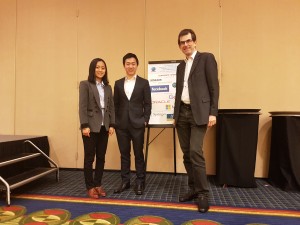
The team had several papers accepted, both in workshops and the main conference. They are:
- ‘Conventionalized gestures for the interaction of people in traffic with autonomous vehicles’, by S. Gupta et al.
- ‘A Neuro-Fuzzy based Hybrid Intelligent Framework for Transport Mode Detection’, by R. Das and S. Winter.
- ‘Activity-based ridesharing: Increasing flexibility by time geography’, by Y. Wang et al.
- ‘Autonomous car and ride sharing: flexible road trains’, by N. Agatz et al. (Best Vision Paper)
Congratulations to the team!
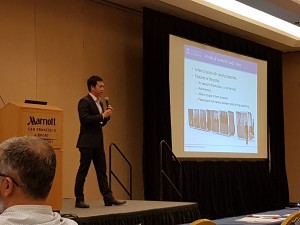
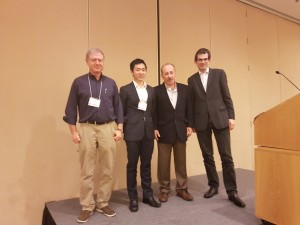
The University of Melbourne booth at the 23rd ITS World Congress, Melbourne
The University of Melbourne had a booth at the 23rd ITS World Congress, held in Melbourne, which we helped organised. The purpose of the booth is to showcase the ITS research capabilities at the university and attract interest from industry for potential collaboration.
The booth had many visitors and can be considered a success. There are some discussions for potential projects resulting from the engagement.
A flyer has been produced for this purpose (PDF)
In addition, Ronny presented his findings on anticipatory algorithm for shared passenger-freight DRT services, the details of which can be found in the Publications section.
Michael Rigby’s graduation
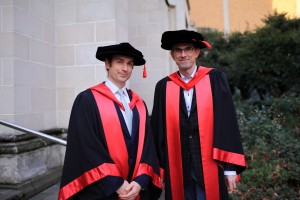
Presentation of FMS Victoria results in Singapore
On 25-26 July 2016, Stephan Winter attended the Future Urban Mobility Symposium at the National University of Singapore. He presented the findings from FMS Victoria, which attracted interests from other participants.
International Workshop on Computational Transportation Science
Stephan Winter is co-chairing this year’s International Workshop on Computational Transportation Science, October 31st, 2016, San Francisco Bay Area, California, USA.
The workshop is aiming to address the prominence of connected automated vehicles technologies in the global auto industry’s near-term growth strategies, of big data analytics and unprecedented access to sensing data of mobility, and of integration of this analytics into the optimisation of mobility and transport. In particular, the following themes are encouraged:
- Collaborative transport, including collaborative multi-modal transport
- Computational and artificial intelligence aspects of assisted driving, collaborative transport or multi-modal transport
- Crowd sourcing and participatory sensing in transport
- Cameras as sensors for trajectory acquisition and event recognition
- Computer Vision-based information extraction from image sequences
- Context aware analysis of movement data
- New processing frameworks for handling masses of transport data (e,. Hadoop)
- Uncertain information in collaborative transport and assisted travelling
- Mechanism design for collaborative behavior
- Data mining and statistical learning for travel information
- Human-computer interfaces in intelligent transportation applications
- Privacy, security, and trust in transportation information
- Novel applications targeted to health, mobility, livability and sustainability
The workshop is now accepting paper submission until 2 September 2016.
Michael Rigby has finished his PhD candidature
Michael Rigby has completed the examination process of his thesis. He will be conferred in August. Congratulations Michael!
2016 iMod final workshop, 24 Mar 2016
On Thursday 20 March 2016, the fourth and final annual iMoD workshop took place at the University of Melbourne.
As last time, the researchers in the group presented their latest works to the industry partners, including the FMS Victoria project.
In this workshop, the discussion focused on wrapping up the project within this year – how we should deliver our results to the industry partners to benefit their day-to-day operations the most. The industry partners attending the workshop provided useful feedback in this regard.
However, the research students will continue working on their topics, which are still within the umbrella of this project: comparison study between DRT and conventional public transport; social-network based ride-sharing; and understanding mobility from GPS traces.
Best poster at Disrupting Mobility
All five posters from our group presented at the summit, while the editor was assessing for the award.
We (Kutadinata, Das, Duffield, Jain, Kotagiri, Kulik, Navidikashani, Rigby, Ronald, Thompson, Wang and Winter, with Kelly and Wallace (Monash University)) have won the Best Poster Award at last week’s Disrupting Mobility, a Global Summit Investigating Sustainable Futures held in Cambridge, MA. Our awarded poster, Shared, Autonomous, Connected and Electric Urban Transport, showed results of various aspects of the ongoing ARC Linkage Project Integrating Mobility on Demand in Urban Transport Infrastructures.
View the presented posters (as PDF files):
- R. Kutadinata, R. D. Das, C. Duffield, S. Jain, R. Kelly, R. Kotagiri, L. Kulik, Z. Navidikashani, M. Rigby, N. Ronald, R. Thompson, M. Wallace, Y. Wang, S. Winter, ‘Shared, autonomous, connected and electric urban transport.’ – the big picture of the Linkage Project
- N. Ronald, R. Thompson, R. Kutadinata, S. Winter, ‘Optimizing shared on-demand passenger and goods mobility.’
- Z. Navidikashani, S. Winter, N. Ronald, R. Kutadinata, ‘Disruptive effects of demand responsive transport systems on mobility.’
- Y. Wang, N. Ronald, R. Kutadinata, S. Winter, ‘How much is trust: The cost and benefit of ridesharing with friends.’
- S. Jain, N. Ronald, R. Thompson, R. Kutadinata, S. Winter, ‘Exploring susceptibility of shared mobility in urban space.’
Urban Connectedness: Shaping the Modern City
Stephan Winter, in his other role as Fellow of the Melbourne Networked Society Institute, chaired a panel of speakers on an event of the Melbourne Knowledge Week, on 21 October. This public forum brought together a panel of experts to discuss how the networked society is transforming our cities, and to critically examine how urban connectedness can increase productivity, sustainability and liveability. Intelligent mobility on demand provided an appropriate background.
Visitors from South Korea
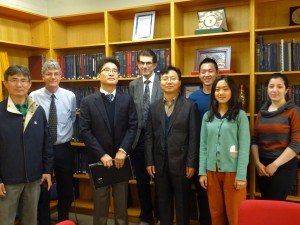
On 27 August 2015, we had academic visitors from South Korea, namely Yong Geol Kim (Kunhwa Engineering & Consulting), Jonghak Han and Bongman Seo (both from the Incheon Development Institute). The purpose of their trip was to investigate the operation of DRT services in Melbourne for the development of possible DRT services in Ganghwa County, Incheon. Currently, some regular bus lines in Ganghwa County are experiencing very low uptake, which sparked their interest of implementing DRT in those low-demand areas away from the city centres. They were particularly interested in the operations of PTV’s Telebus in Lilydale and Flexiride in Yarrawonga. and the government’s approach to handle legal controversies of DRT services. In addition, during the meeting we presented the progress of the project, ideas, and preliminary findings. We will keep in touch with them for future possible collaborations.
International Workshop on Computational Transportation Science
Stephan Winter has been invited to give a keynote at the International Workshop on Computational Transportation Science, in conjunction with the ACM SIGSPATIAL Conference in November in San Francisco Bay Area, CA. He will present results of the project to an international audience.
Disrupting Mobility Summit
The group submitted five abstracts for poster presentations in the Disrupting Mobility Summit: A global summit investigating sustainable futures to be held in November, Cambridge MA. All five were accepted. This summit is an interactive forum for leading executives, government representatives, and academics to discuss sustainable futures of transportation. It will bring together around 350 mobility experts from different continents. The program will tackle current trends in mobility by attracting thought leaders from companies, governments and academia. More details about the summit.
Here is the list of the posters we will present at the summit:
- R. Kutadinata, R. D. Das, C. Duffield, S. Jain, R. Kotagiri, L. Kulik, Z. Navidikashani, M. Rigby, N. Ronald, R. Thompson, M. Wallace, Y. Wang, S. Winter, ‘Shared, autonomous, connected and electric urban transport.’ – the big picture of the Linkage Project
- Ronald, R. Thompson, R. Kutadinata, S. Winter, ‘Optimizing shared on-demand passenger and goods mobility.’
- Navidikashani, S. Winter, N. Ronald, R. Kutadinata, ‘Disruptive effects of demand responsive transport systems on mobility.’
- Wang, N. Ronald, R. Kutadinata, S. Winter, ‘How much is trust: The cost and benefit of ridesharing with friends.’
- S. Jain, N. Ronald, R. Thompson, R. Kutadinata, S. Winter, ‘Exploring susceptibility of shared mobility in urban space.’
CCI kick-off workshop 25 June
One of the workshops held to kick-start the CCI project, to be held on Thursday 25 June 2015 in the University of Melbourne Parkville campus. This workshop is used as a brainstorming session to identify issues and research challenges associated with creating sustainable urban mobility schemes.
iMoD at Locate 15
Rahul Deb Das and Stephan Winter will be attending Research@Locate, held in conjunction with Locate 15, starting today in Brisbane, Australia. Rahul will be presenting a paper as part of his PhD research on mode detection from GPS traces. Feel free to talk to them about the iMoD project!
CAITR 2015: hosting and more DRT
Shubham Jain will be attending CAITR (Conference of Australian Institutes of Transport Research) on 12-13 February, hosted by the Melbourne School of Engineering. He will be presenting work-in-progress on his MPhil thesis, focusing on the simulation of demand for demand-responsive transportation.
Mobility and accessibility is a problem for growing cities. To meet this challenge in a sustainable way, taking congestion, fuel consumption, and environmental impacts into consideration, new forms of transport need to be considered. One possible solution is Demand Responsive Transport System (DRTS) which provides flexible point-to-point service on casual requests. It operates at flexible routes and does not have pre-defined schedules. Before deploying a DRTS, we need to simulate the facility and we require to predict travel demand for it. Activity-based micro-simulation models for travel demand explicitly recognise that individuals and households are the actual decision makers, and that travel demand is derived from travellers’ desire to participate in spatially dispersed activities. This research attempts to predict travel demand for DRTS using activity based modeling. This paper presents early research and findings on generating synthetic population of city of Melbourne using PopGen and PopSynWin software and their comparison. Further research would assign travel diaries to synthetic population using Victorian Integrated Survey of Travel and Activity (VISTA) data and predict mode shift to DRTS.
Joann Yang, a research assistant in Infrastructure Engineering at the University of Melbourne, will also present a literature review on on-demand freight transportation. This is part of another paper in preparation for the upcoming City Logistics conference, which uses the demand-responsive transport simulations developed as part of the iMoD project to explore on-demand, shared passenger/goods travel.
Note that both Russell Thompson and Nicole Ronald are involved in organising CAITR, so will be present as well. We are looking forward to welcoming all the participating students, researchers, and practitioners from around Australia!
iMoD at TRB 2015
Nicole Ronald will be representing the iMoD team at the Transportation Research Board Annual Meeting, to be held next week in Washington, D.C. She will be presenting a paper on simulating demand-responsive transport using an existing fixed-time system in Yarrawonga/Mulwala, Australia and comparing it with a flexible-time system.
If you are interested in talking to Nicole about iMoD, contact her beforehand to set up a meeting time or drop by her lectern session at 8am Wednesday morning.
ITSC 2014, 8–11 October
iMoD is well-represented at this week’s IEEE Intelligent Transport Systems Conference in Qingdao, China.
Rahul Deb Das will present his work on automated detection of mode transfers based on GPS data. A poster by Michael Rigby on visualising pickup locations for ridesharing will also appear. Joint work by Stephan Winter with Iven Mareels (Dean, Melbourne School of Engineering) and IBM Research on personalized (leased) public transportation will also be presented.
Please feel free to contact Rahul or Stephan to organise a meeting about the iMoD project.
GIScience 2014, 23–26 September ass="topic">
Stephan Winter and Michael Rigby will be attending this week’s GIScience conference in Vienna, Austria. They are particularly interested in talking to other attendees about ridesharing and flexible transportation, in particular those aspects relating to spatial information and cognition.
CAITR 2014: Intelligent mobility on demand – a review of literature and tools and future directions
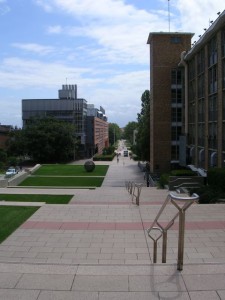
Dr Nicole Ronald will be attending CAITR (Conference of Australian Institutes of Transport Research) on 17–18 February, hosted by the rCiti group at UNSW. She will be presenting work-in-progress on the iMoD project, focusing on the simulation of demand-responsive transportation and early results.
Urban mobility and accessibility is a problem for growing cities. New ideas are required to increase mobility and access in a sustainable way, taking congestion, fuel consumption, and environmental impacts into consideration.
One possible solution is sharing transport resources, along the lines of bike sharing, car sharing, or ride-sharing, and enhancing the benefits of shared resources by making them demand-responsive. Although these systems are gaining traction internationally, many fail due to poor implementation, planning and marketing. Being able to realistically simulate these systems to evaluate viability and demand before implementation is important.
A team of researchers at the University of Melbourne, Monash University and University of Newcastle is investigating the viability of novel mobility-on-demand systems. This involves estimating the demand for travel, modelling the behaviour of potential users, developing scheduling and matching algorithms, and building simulations to evaluate systems in various urban environments and scenarios.
This presentation will report on early research outcomes and work-in-progress, focusing on a thorough review of the demand-responsive transportation literature and potential simulation approaches.
ACM SIGSPATIAL GIS 2013, 5–8 November
Professor Stephan Winter and Michael Rigby will be attending the 21st ACM SIGSPATIAL International Conference on Advances in Geographic Information Systems (known in short as ACM SIGSPATIAL GIS 2013) in Orlando, Florida, USA.
Michael will be presenting his work on a client user interface to support centralized ride share planning in the main track of the conference, while Stephan will be presenting a paper undertaken with Dr Nicole Ronald, Dr Russell Thompson, and John Haasz on demand-responsive transportation viability in the 6th ACM SIGSPATIAL International Workshop on Computational Transportation Science.